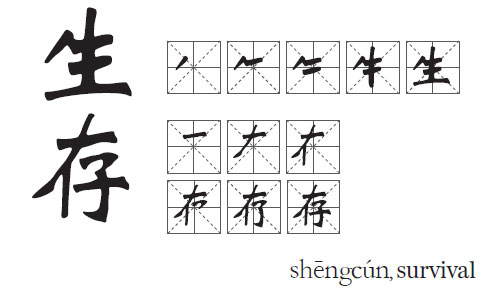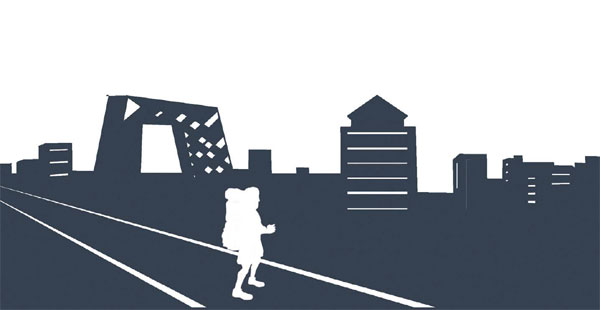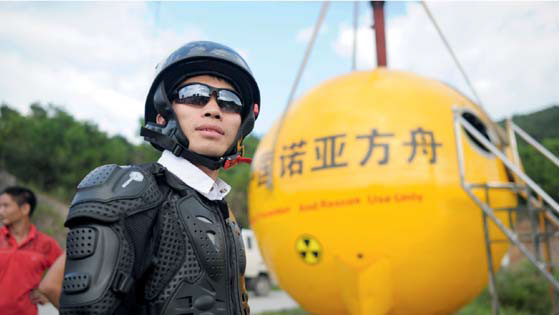China's survivalist revival

Some in the newly prosperous middle class have caught survival fever
One commenter asks whether radiation from the sun could turn the Ebola virus into a zombie plague. He is dismissed and jeered in the comments, as a discussion on how to reduce the weight of a "bug out" bag picks up steam. Elsewhere, users debate the merits of bows and arrows, how to treat bullet wounds, and gas mask maintenance.
Welcome to the Survival Fanatics Baidu Tieba forum.

| Businessman Yang Zongfu spent 1.5 million yuan building a survival pod named Noah's Ark in Yiwu, Zhejiang province, in 2012. Provided to China Daily |
Home to an eclectic mix of about 60,000 members who share an interest in preparing for disaster, the forum was founded in 2008. According to Wang (a pseudonym), a moderator of the group, members come from a diverse range of backgrounds.
"Most are middle class, and they are basically survivalists because they want to maintain their living conditions and social status (in the event of a disaster)," Wang says. "The middle class is the backbone of the survivalist movement as their material and spiritual enjoyment is much higher than those of the worker and peasant classes," Wang says, highlighting the fact that the middle class has more to protect.
When Deng Xiaoping rolled out the reform and opening-up policy in the '70s and proclaimed that China should "let some people get rich first", a middle class was inevitable. So with the proliferation in material possessions in a country that has weathered a tumultuous history, it is perhaps unsurprising that such rapid growth would also promote a certain sense of insecurity among those who have accumulated a moderate level of material well-being.
Thus, the modern survivalist movement was born.
Defining exactly what constitutes a survivalist is a difficult task, as they come in many forms. In the most general sense, it is a need for preparedness, though Wang points out that in some cases this can be as simple as "focusing on their lives and property in their daily lives and safety, such as making sure they adhere strictly to road rules, using fire and electricity safely, educating their children with safety knowledge, and preparing self-help or emergency items for the elderly".
He says that those who carry it a bit further might "install burglar alarms in their homes, give capsaicin spray to family members - particularly females - and carry portable self-help tools or certain drugs provided they are not against the law."
Those who take it further prepare survival kits and invest in improving their skills, such as swimming, camping, repair and medical care.
Those interested in survivalism tend to be young males. Active members who engage in activities or purchase survival gear tend to be in their 20s or 30s, though members of online discussion groups are often adolescents in high school, or university students and people who have just started to work.
"They are energetic and have a lot of time, and are among the next generation of the middle class," Wang says.
From his own observations of those posting in the forum, Wang noticed more subtle markers that crop up among members, a lot of which demonstrate their cautious attitude.
Those with resources tend to believe in the importance of being insured and tend to be concerned about their health and the health of family members. Interestingly, "they tend to avoid high-risk investments", and "make long-term development plans for their families".
In contrast to their cautious side, they also often "engage in outdoor activities and competitive sports, first-aid training, and even extreme sports."
But as with all demographic groups, there are the dilettantes - and worse.
"Many of the adolescent members have a passion for the idea of defending themselves in combat. They often buy and carry around 'cool' gadgets to show off," Wang says, indicating this is more of a harmless fad. However, he also points out that "the younger a survivalist is, or sometimes those from a lower social strata, the more focus they put on violence and anarchy after a serious disaster. They are more likely to confuse 'combat abilities' with 'survival abilities'."
Wang also says he cannot "rule out the idea that some of them might have mental disorders. The older they are, and the higher they are in terms of social class, the more likely they are to consider survival at the micro, macro and strategic level."
Such far-fetched doomsday scenarios have gripped imaginations in the past China, leading to a variety of responses from creative survivalists. In the lead up to the 2012 "Mayan apocalypse", one Hebei farmer, working out of a workshop in Beijing, invested his life savings in creating "apocalypse pods" for sale. They were round balls of steel and fiberglass that, in theory, could protect individual for up to four months, insulated so that even at the North Pole they could survive in the event of a tsunami.
He was not the only person creating disaster pods, with a Zhejiang resident and a man from Xinjiang also building pods and a kind of Noah's Ark, respectively.
The Survival Fanatics group is not without its own bizarre posts. "There are very few people who prepare themselves for nuclear wars, the world's zombie apocalypse, etc. Some of them are playing at survivalism, while others are not understood by society or even our own circle," Wang says.
Wang's own interest in survivalism coalesced out of a number of events in his childhood and young adult life. Guides for militia members were commonplace, so the general survivalist concept was not unfamiliar to Wang. Also, unlike the many young Chinese today who are raised in cities or village communities divorced from nature, Wang not only was raised close to nature, but was also exposed to tales like Robinson Crusoe. He was also a fan of the Chinese children's cartoon the Haier Brothers, a tale of two children who travel around the world exploring nature and seeking solutions to human disasters.
Still, this was hardly enough to make him interested in survivalism. Growing up, however, he experienced a number of mishaps and hardships, ranging from an electric shock and food poisoning to an incident that, he says, "threatened the safety of a number of people".
When a supply-chain scare menaced Wang's area - a surprisingly common occurrence in China, involving garbled news about something like food contamination or a disaster, such as the Fukushima reactor meltdown in Japan in 2011 - he began to "view the world from the perspective of a survivalist".
Though today's middle class may make up the modern survivalist movement due to their improved disposable income, Wang says these kinds of sentiments are hardly new in Chinese history. "In ancient China people raised children to look after them in their old age and often hoarded food for a rainy day. From China's feudal periods to the Republic of China period, wealthy and prestigious families often had traditions such as these and passed them down."
Courtesy of The World of Chinese, www.theworldofchinese.com
The World of Chinese

(China Daily European Weekly 09/18/2015 page25)
Today's Top News
- Japan tempting fate if it interferes in the situation of Taiwan Strait
- Stable trade ties benefit China, US
- Experts advocate increasing scope of BRI to include soft power sectors
- New engine powers cargo drone expansion
- China to boost green industry cooperation
- Manufacturing PMI rises in November































